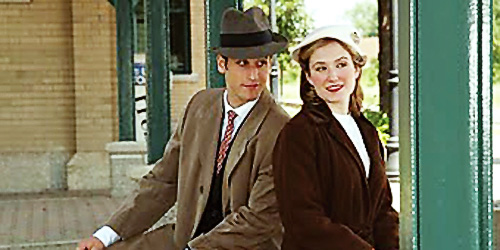By Bridgette M. Redman

Alfred Uhry is a popular man in Michigan this summer.
The playwright who created a trilogy of shows about Jews in Atlanta, Georgia has had all three works staged by professional theaters in the state this summer. First, Farmers Alley Theater in Kalamazoo performed "Parade," a musical exploring the arrest and lynching of a Northern Jewish man after the rape and murder of a young girl in an Atlanta pencil factory where he was supervisor. Then last weekend weekend, Hope Summer Rep and the Michigan Shakespeare Festival opened with the other two legs of the trilogy: "The Last Night of Ballyhoo" and "Driving Miss Daisy."
"The Last Night of Ballyhoo" takes place nearly 40 years after the musical, on the eve of the "Gone with the Wind" premiere in 1939. Uhry presents seven Jewish characters, most of whom are obliviously suffering from an identity crisis.
Kathleen Mary Mulligan and Hayley Galbraith are the two widows, Boo and Reba, who both worry over their young adult daughters Sunny and Lala (played respectively by Abbe Tannenbaum and Cat Stephani) while being supported by Boo's brother, Adolph (Chip Duford).
This play is a favorite of community theaters, given its limited set requirements and straightforward story. However, in the hands of a professional company such as Hope Summer Repertory Theatre, the many subtleties and challenges of "Ballyhoo" are revealed. This is a domestic comedy with a serious undertone. It is a show that demands spot-on accents, a demand handled quite ably by this cast. Only Duford stumbled with some of the lines, filling his mouth to such a degree that the words jumbled together and were difficult to understand. Even this, though, was rare.
Mulligan and Galbraith create characters who are as unlike in temperament as they are alike in family values. Uhry contrasts the bitterness of the one with the innocence of the other, and Mulligan and Galbraith bring a depth of character to both of them.
Stephani's Lala rivals Laura of "The Glass Menagerie" in her fragility and social awkwardness, but possesses none of the delicacy. Lala is the lost would-be heroine who cannot succeed in the world she wants to inhabit, yet pretends that everything is just as it should be. Stephani beautifully handles this balance, keeping her very real even when Lala's behavior turns her into a comic figure.
Ballyhoo itself is the perfect background for the conflicting feelings this family has about its own Jewishness and the snobbishness with which they separate themselves from more "Jewish Jews." Ballyhoo takes place at the club where all the "right" Jews go. The elders argue about where Ballyhoo started, but it is the social event of the year for the entire region, which sets itself up as a wannabe imitation of events held by Christians where Jews are unwelcome.
When Joe Farkas (Michael Haller) enters the scene, he's surprised at how different the culture is from what he experienced in New York. He's concerned about Hitler and the family he has in Poland and Russia. In the Freitag home, only Adolph seems aware that there is a world outside the South and the obnoxious Peachy (Michael Hanson) is outright disdainful of any concern, claiming it is Europe's problem.
It is Haller and Tanenbaum who bring the seriousness to this comedy. Haller's Joe challenges the lack of ethnicity and the prejudice that he finds against the "other kind" of Jew, all with a disarming charm. He rightly identifies them as Jews who don't want to be Jews. Tanenbaum's Sunny, a Wellesley student who is fond of Upton Sinclair, listens and tries to understand.
Tanenbaum gives Sunny a sweetness that matches her name. She is everything that her cousin is not — beautiful, intelligent, graceful and insightful. Tanenbaum is also the most connected of the actors on the stage and reveals much of her good character with the smiles and glances she gives others who are speaking.
Hope Summer Rep's "Last Night of Ballyhoo" is a highly entertaining presentation that works, because all of the performers are committed to their characters and fully immersed in the story. It is easy to care about each of them.
Together this cast, led by director Daina Robins, wittily present a character study of two generations and their identity struggles. While the ending is abrupt and one that breaks character for all but two of the people, it gives the satisfying suggestion that there might be a happily ever after in store for the Freitags and the young men who have come a-courting.
REVIEW:
'The Last Night of Ballyhoo'
Hope Summer Repertory Theatre, DeWitt Theatre, 141 E. 12th St., Holland. Plays in repertory through Aug. 13. $8-$19. 616-395-7890. http://www.hope.edu/hsrt










